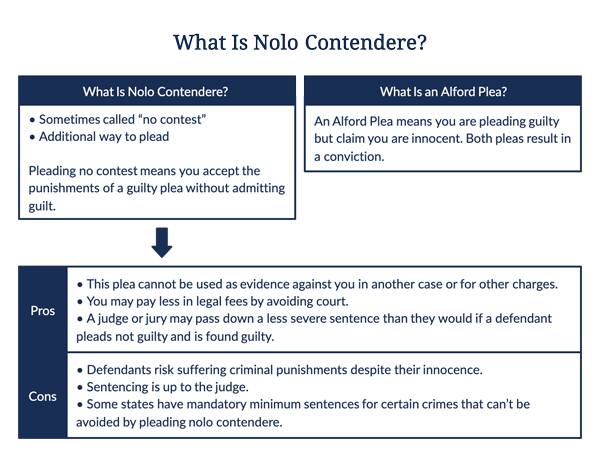When it comes to a traffic violation in Texas, pleading no contest has the same outcome as pleading guilty, meaning you have to pay the fine. However, a plea of no contest cannot be used against you in a civil suit, while a guilty plea can.
When faced with a traffic violation in Texas, individuals often find themselves torn between pleading guilty or no contest. While both pleas have similar outcomes in terms of fines, there are key differences to consider. Understanding the implications of each plea can help individuals make an informed decision that aligns with their best interests.
We will explore the differences between pleading guilty and no contest, the potential consequences of each plea, and the factors to consider when making this important decision. Whether it’s understanding the legal implications or seeking guidance from a professional attorney, arming oneself with knowledge is crucial when dealing with traffic violations.

Credit: sddefenseattorneys.com
What Is A Guilty Plea?
In the legal system, a guilty plea is an admission of guilt by the defendant. By entering a guilty plea, the defendant acknowledges that they committed the act charged and that it is prohibited by law. It also means that they have no defense or excuse for their actions.
Admitting To The Offense
A guilty plea is a straightforward way of accepting responsibility for one’s actions. When someone pleads guilty, they are admitting that they committed the crime they are accused of. This admission is significant as it eliminates the need for a trial and saves time and resources for both the court and the defendant.
Unlike pleading not guilty or no contest, a guilty plea acknowledges the wrongdoing and the defendant’s culpability. It is a decisive admission that can lead to certain implications and consequences.
Implications And Consequences
Pleading guilty has several implications and consequences for the defendant. When a guilty plea is entered, it is considered a conviction and will be recorded as such on the defendant’s criminal or driving record. This can have long-term effects on their reputation, employment prospects, and personal and professional relationships.
In addition to a criminal conviction, a guilty plea often results in sentencing. The judge will determine the appropriate punishment based on the severity of the offense, any guidelines or mandatory minimum sentences, and other factors such as the defendant’s criminal history and remorse.
It is crucial for defendants to understand the potential implications and consequences before entering a guilty plea. Consulting with a knowledgeable legal professional can help them navigate the complexities of the legal system and make informed decisions about their plea.
In conclusion, a guilty plea is a legal admission of guilt by the defendant. It carries various implications and consequences, including a criminal conviction and potential sentencing. It is essential for individuals to understand these ramifications before deciding to plead guilty.
What Is A No Contest Plea?
When faced with a traffic violation or a criminal charge, you may find yourself wondering whether to plead guilty or no contest. While both pleas may result in similar outcomes, there are notable differences between them. In this article, we will focus on understanding the concept of a no contest plea and explore its legal implications.
Neither Admitting Nor Denying
A plea of no contest is a unique option for defendants who want to avoid admitting guilt while still accepting the consequences. By pleading no contest, you neither admit to nor deny the charges brought against you. It is a way to accept the punishment without formally acknowledging responsibility.
Legal Implications
Unlike a guilty plea, which can be used against you in civil suits, a no contest plea cannot be used as an admission of fault. This means that if a civil suit is filed against you regarding the same offense, your plea of no contest will not be held against you. This distinction can provide some legal protection in certain circumstances.
Furthermore, a no contest plea may also be beneficial in cases where guilt is evident, but there is a desire to avoid the potential consequences of a guilty conviction. By pleading no contest, you may be able to negotiate a more favorable outcome for your case. This option allows defendants to ensure their interests are protected while avoiding the risks associated with a guilty plea.
It’s important to note that the specific implications of pleading no contest can vary depending on the jurisdiction and the nature of the charges. It is advisable to consult with a lawyer or legal professional before making any decisions regarding your plea.
Key Differences
Understanding the differences between a no contest plea and a guilty plea is crucial in legal matters. Each plea comes with its own set of legal ramifications and implications, especially in civil suits.
Legal Ramifications
When pleading guilty, you admit to the offense charged and acknowledge that it violates the law, which results in a conviction recorded on your criminal or driving record. This can have lasting implications on your legal history and may impact future matters.
In contrast, a plea of no contest, or nolo contendere, does not admit guilt but accepts the punishment without formally admitting to the allegations. While the outcome may be similar to a guilty plea in terms of the imposed penalties, the lack of an admission of guilt can impact subsequent legal proceedings.
Use In Civil Suits
If a civil suit arises from the same offense for which a plea was entered, the distinction between a guilty plea and a no contest plea becomes significant. A guilty plea can be used as evidence against the defendant in the civil case, potentially impacting the outcome.
On the other hand, a plea of no contest generally cannot be utilized as an admission of liability in a civil suit, providing potential protection from the plea being used against the defendant in civil proceedings.
Credit: colawteam.com
Pros And Cons
When considering whether to plead no contest or guilty, it’s crucial to weigh the advantages and disadvantages of each option. Understanding the pros and cons can help defendants make an informed decision that aligns with their legal strategy.
Advantages Of Each
Considerations For Defendants
One key benefit of pleading no contest is that it cannot be used against you in a civil suit, unlike a guilty plea. This can protect you from potential legal ramifications in the future.
Pleading guilty, on the other hand, is an admission of committing the crime. It may lead to a quicker resolution of the case and potentially a more lenient sentence in some situations.
Advantages Of No Contest:
- Protects from civil suits
- May avoid admitting guilt
Advantages Of Guilty:
- Potential for a reduced sentence
- Quicker resolution of the case
Considerations For Defendants
Before making a plea decision, defendants should consult with a criminal defense lawyer to fully understand the implications of each choice. Factors such as the nature of the offense, potential consequences, and personal circumstances should all be taken into account.

Credit: www.nolocontendere.org
Frequently Asked Questions On No Contest Vs Guilty
Should I Plead Guilty Or No Contest To A Traffic Violation Texas?
Plead no contest has same outcome as guilty plea – pay fine; no contest plea can’t be used against you in civil suit.
Is Pleading Guilty The Same As A Conviction?
Pleading guilty and a conviction are not the same, but they lead to similar outcomes. A guilty plea admits fault, while a conviction is formally recorded.
Why Do Criminals Plead Not Guilty?
Criminals plead not guilty to exercise their right to make the prosecution prove their case beyond a reasonable doubt.
What Happens If You Plead Guilty To Dwi In Texas?
Pleading guilty to DWI in Texas means you admit to the charges and have no defense or excuse. It will be recorded as a conviction on your criminal or driving record and you may face penalties such as fines, license suspension, and possibly jail time.
Conclusion
In a traffic violation case, choosing between a guilty and no contest plea can have lasting implications. While both may lead to paying a fine, a no contest plea may shield you from consequences in a civil suit. It’s essential to weigh the options carefully.
Consulting a legal expert is advisable.
{ “@context”: “https://schema.org”, “@type”: “FAQPage”, “mainEntity”: [ { “@type”: “Question”, “name”: “Should I plead guilty or no contest to a traffic violation Texas?”, “acceptedAnswer”: { “@type”: “Answer”, “text”: “Plead no contest has same outcome as guilty plea – pay fine; no contest plea can’t be used against you in civil suit.” } } , { “@type”: “Question”, “name”: “Is pleading guilty the same as a conviction?”, “acceptedAnswer”: { “@type”: “Answer”, “text”: “Pleading guilty and a conviction are not the same, but they lead to similar outcomes. A guilty plea admits fault, while a conviction is formally recorded.” } } , { “@type”: “Question”, “name”: “Why do criminals plead not guilty?”, “acceptedAnswer”: { “@type”: “Answer”, “text”: “Criminals plead not guilty to exercise their right to make the prosecution prove their case beyond a reasonable doubt.” } } , { “@type”: “Question”, “name”: “What happens if you plead guilty to DWI in Texas?”, “acceptedAnswer”: { “@type”: “Answer”, “text”: “Pleading guilty to DWI in Texas means you admit to the charges and have no defense or excuse. It will be recorded as a conviction on your criminal or driving record and you may face penalties such as fines, license suspension, and possibly jail time.” } } ] }